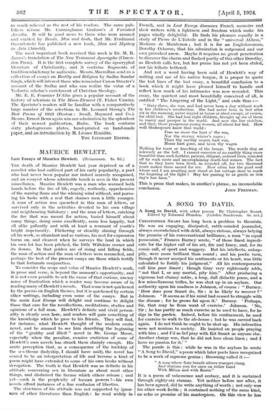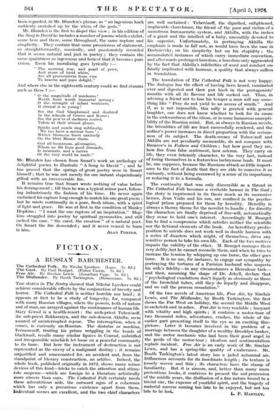A SONG TO DAVID.
A Song to David, with other poems. By Christopher Smart. Edited by Edmund Blunden. (Cobden Sanderson. 6s. net.)
CHRISTOPHER SMART has long been a problem to theorists. He was an engaging, dissipated, rattle-minded journalist,
always overwhelmed with debt, always riotous, always belying the promise of his conversational brilliance, a man " in equal possession," Frances Burney wrote, " of those finest ingredi- ents for the higher call of his art, fire and fancy, and, for its comic call, of sport and waggery. But his intellects, unhap- pily, were more brilliant than sound ; and his poetic turn, though it never usurped his sentiments or his heart, was little calculated to fortify his judgment." All his contemporaries
call him poor Smart ; though Gray very righteously adds, " not that I, or any mortal, pity him." After producing a vigorous but clumsy satire, a long, dull didactic poem, and a few miscellaneous trifles, he was shut up in an asylum. Our
authority upon his madness is Johnson, of course : " Burney.
` How does poor Smart do, Sir : is he likely to recover ? ' Johnson. ` It seems as if his mind had ceased to struggle with the disease ; for he grows fat upon it.' Burney. ' Perhaps, Sir, that may be from want of exercise.' Johnson. ' No, Sir ; he has partly as much exercise as he used to have, for he
digs in the garden. Indeed, before his confinement, he used for exercise to walk to the ale-house ; but he was carried back again. I do not think he ought to be shut up. His infirmities
were not noxious to society. He insisted on people praying with him ; and I'd as lief pray with Kit Smart as anyone else. Another charge was, that he did not love clean linen ; and I have no passion for it.' " The puzzle is this : while he was in the asylum he wrote "A Song to David," a poem which later poets have recognized to be a work of supreme genius ; Browning called it :-
" A song where flute-breath silvers trumpet-clang, And stations you for once on either hand With Milton and with Keats."
It is a poem of vehemence and ecstasy, and it is sustained through eighty-six stanzas. Yet neither before nor after, it has been agreed, did he write anything of worth ; not only was his other work feeble ; it contained nothing of the same kind, no echo or promise of his masterpiece. On this view he has been regarded, in Mr. Blunden's phrase, as " an ingenious hack suddenly snatched up by the whim of the gods."
Mr. Blunden is the first to dispel this view ; in his edition of the Song to David he includes a number of poems which exhibit,
some here and there, some throughout, the same rapture and simplicity. They contain that same prosaicness of statement, so straightforwardly, musically, and passionately recorded that it seems natural and just in poetry ; they contain the same quaintness so ingenuous and honest that it becomes pure vision. Even his moralizing goes lyrically :-
" The morning star, and pearl of price,
And stone of lucid white, Are all provocatives from vice To heaven and pure delight."
And where else in the eighteenth century could we find stanzas such as these ? -
" 0 the magnitude of meekness !
Worth from worth immortal sprung ; 0 the strength of infant weakness, if eternal is so young !
See the God blasphemed and doubted In the schools of Greece and Romo ; See the pow'rs of darkness routed, Taken at their utmost gloom.
Spinks and ouzels sing sublimely, ' We too have a saviour born ' Whiter blossoms burst untimely On the blest Mosaic thorn.
God all-bounteous, all-creative, Whom no ills from good dissuade, Is incarnate, and a native Of the very world he made."
Mr. Blunden has chosen from Smart's work an anthology of delightful poems to illustrate " A Song to David " ; and he
has proved that the springs of great poetry were in Smart himself ; that he was not merely for one instant stupendously gifted with an irrecoverable fire.
It remains true that Smart wrote nothing of value before his derangement ; till then he was a typical minor poet, follow- ing industriously the fashion of his time. He never again sustained his rapture long enough to match his one great poem ;
but he wrote continually in a pure, fresh idiom, with a spirit of light and grace. He was at first in the condition of Manley
Hopkins : " I want the one rapture of an inspiration.". Hop- kins struggled into poetry by spiritual gymnastics, and still lacked the ease, " the carol, the creation " of a natural poet. On Smart the fire descended ; and it never ceased to burn



























































 Previous page
Previous page